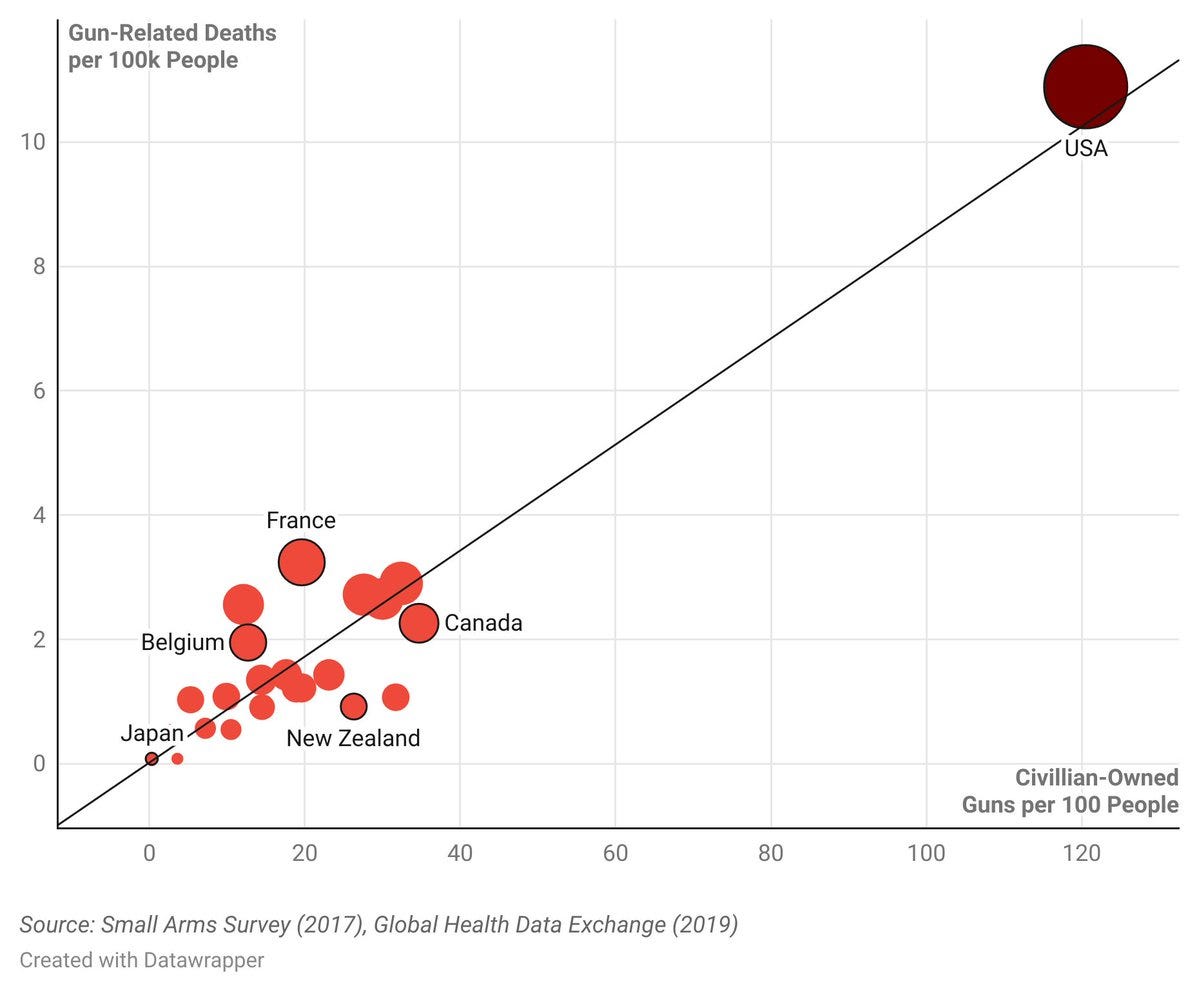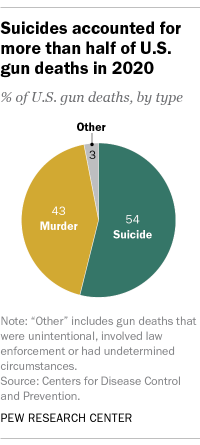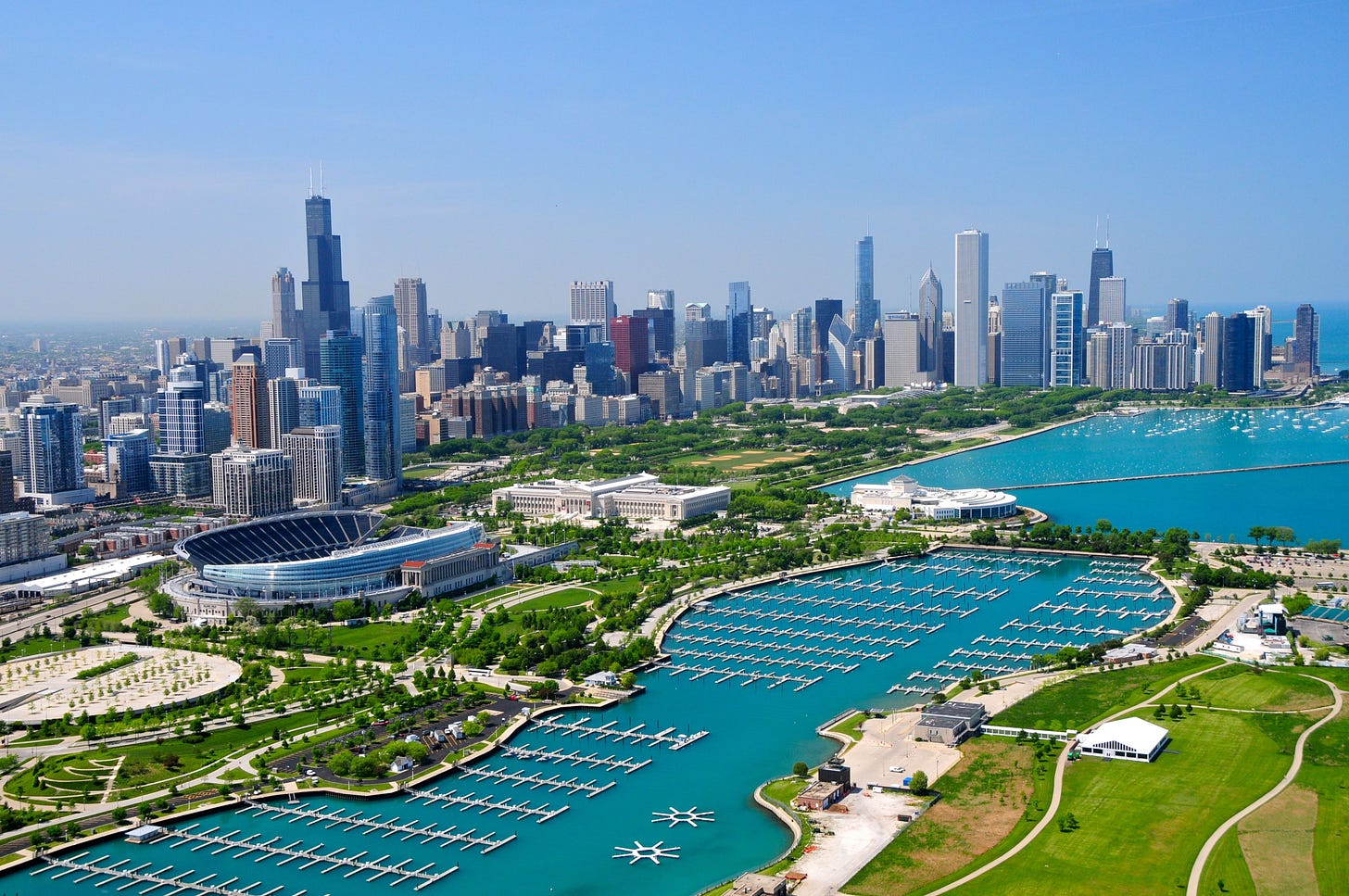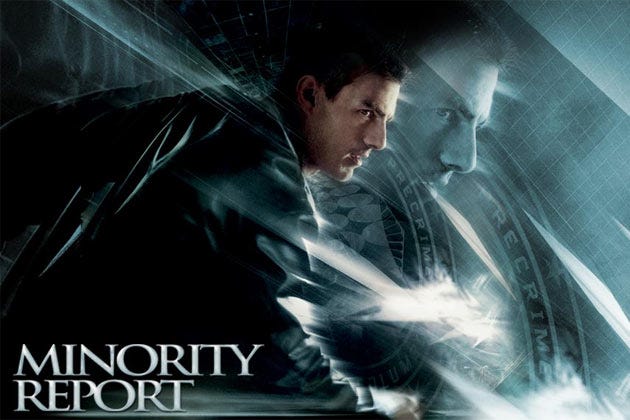guns (bargument #3)
the banality of mass shootings, and how to talk about it
I think we have a bona fide series here! This is the third entry in my “bargument series”, the first was about the controversies surrounding the end of the war in Afghanistan. I followed-up with my takes on the Roe decision and how pro-choice folks should think about the issue with the goal of winning a bargument. This entry will address some of the common points I hear when discussing the issue of gun control, mass shootings, and the second amendment with pro-gun folks; and all of which frequently take place after a mass shootings.
As usual, I have a brief disclaimer on why I think this kind of writing / preparation is important, we’re not just trying to generate conservative tears, but be convincing and work towards a better society.
[It] is a good reminder that the battle of ideas is won by those who think critically and prepare. It is not solely ideological. And as good as it feels to win an argument, it feels much better to know that you are on the right side of history. So doing the work and being able to articulate it is important.
In that spirit, here’s my guide to the ongoing gun debate.
When it comes to the post-mass shooting gun debate there are generally four arguments I hear and want to address:
Mass Shootings aren’t the real problem;
Motive;
The Second Amendment; and
“Chicago”
Each touch on different parts of the inter-play between liberals and conservatives in the debate, but as we dig in we’ll also start to highlight some intra-liberal arguments and inconsistencies which once reviewed might help to form stronger arguments, and better policy.
I. Mass Shootings aren’t the real problem
The first argument acknowledges that there are many gun deaths in the United States, even when adjusted for a variety of factors — it’s a telling datapoint.
This is a good starting point for any discussion around guns in our country, because if we can get everyone to agree that (1) there are a uniquely large amount of gun deaths, and (2) that those deaths are a problem, then we can have some common ground to work with. But that’s where the debate (with the all-too-visible background of a mass shooting on the mind) takes a turn.
The first point you might hear from someone with a pro-gun or conservative-lean might be that while gun deaths are high the majority of those deaths are suicide. This will be followed up with some permutation of the fact that only a small fraction of gun murders are perpetuated with rifles (this category includes the somewhat ambiguous term guns referred to as “assault weapons”).
At this point you (or in most cases, I) might have already staked your claim with some position like “we need to ban assault rifles”. This will result in your opponent trying to corner you with technicalities around what an assault rifle is, and you’ll get stuck in definitional limbo. Not fun, not productive, and let’s be honest, they probably know more about weapons than you and it’ll make you look unprepared.
Even if you avoid that pitfall of the stats above, the person across the table still will bring up something about black-on-black violence or just mention “Chicago”, and it’s over (until later).
Instead of backing yourself into a corner let’s start with the stats and back our way into a position (radical idea, I know).
Suicides represent the majority of gun deaths, and
Rifles only account for a small portion of murders
What was the start of this conversation when you started? To advocate for less guns because you see a clear link between these assault-style weapons and the horrific events at schools. That is an incredibly valid view, and the right one. So just say that!
If you’re horrified by these events and want to make a change put the onus on them. Focus the discussion on how you would have liked to stop this event, and maybe if there was a smaller capacity weapon so much bloodshed might not have occurred. You might be able to parlay that into some agreement about how maybe it’s the high-capacity nature of weapons that needs to be addressed.
Always remember, when you’re in a debate with a crowd being the reasonable one looking for compromise will win you points.
Another argument you might hear from a conservative during this is that the Democrats (you, presumably) are taking advantage of a national tragedy to ram through legislation. Well first, duh. That’s politics. But second, let’s take that claim as if it’s being offered in good faith.
Okay — if Mitch McConnell and his goons say now is not the time to talk about reform…fine? Legislating in the heat of the moment has resulted in some pretty heinous stuff - Japanese Internment Camps, the PATRIOT ACT, etc… Let’s yield that point. But when?
It’s not like conservatives only become averse to gun legislation when a mass shooting happens, they always are. When there aren’t mass shootings, they are actively working to loosen gun safety laws. A compromise (one that is in no way necessary, but good debate tactic) might be to say sure, we’ll wait. But for how long? Put it in their court to decide a correct amount of wait time to determine. This serves two purposes, one it puts them on the defensive, and two, you can go back to drinking.
II. Motive
The second argument I hear that can get people caught up is focusing too much on the motive or identity of the killer. A lot of really cynical folk out there like to say that the media outrage machine will treat these criminals differently depending on the motive of their crime.
When it’s a radical Islamic terrorist the right starts to preach that we need to clamp down on immigration policies, and maybe even take aggressive military action. If it’s a skinhead with ties to a White Supremacy group the Left starts promoting increased surveillance and monitoring of groups and increased background checks.
The point I’m trying to bring up here is that I don’t need to know the identity or affiliation of a mass killer to know that they are a deranged person. One whose motivations and actions are far beyond the pale of the mainstream. It’s a heinous act, period.
I also don’t need to know their weapon of choice to know that something needs to be done about guns in this country. My view on violence and gun regulation is not dependent on a single event - I don’t care if a school was shot up by a handgun, assault rifle, or shotgun. It’s all terrible and needs to be addressed!
To frame this another way let me take a quick detour to the weather. A common “did you know” factoid in the TikTok era revolves around weather probabilities. As a quick overview - if the meteorologist says there’s a 20% chance of rain - that could mean there’s a 40% chance of rain over only 50% of the total forecast area. Basically - if you’re in the unaffected area it’s not a 20% chance, but it’s a good approximation tool for weather channels who serve a large community. Here’s Vox with a better explanation.
How does this tie back to gun violence? Well, as I see it any individual mass shooting is like a weather forecast. It might be by an Islamic Terrorist, or maybe a White Supremacist. The individual “forecast” isn’t a guarantee of a certain underlying motivation or problem. These are deranged people - every instance is different.
BUT, on the whole, like the forecast, they give a directionally correct view on the core issue. If the weather channel says there’s a 40% of rain I’m going to wear a coat, and if there are hundreds of mass shootings a year I’m going to want to address to gun violence epidemic in this country. It doesn’t matter if the rain hits another county or the shooter doesn’t align with your personal view on what a mass shooter looks like. It’s still raining.
So don’t let yourself get caught up in trying to nit pick the differences between killer motives, they’re all clinically insane and deserve no sympathy. Focus on the issue that matters, gun control; the weapon enabling these killings.
III. The Second Amendment
When backed into a corner gun-rights defenders often lean on the Second Amendment, and rightfully so. Its text is relatively clear:
A well regulated Militia, being necessary to the security of a free State, the right of the people to keep and bear Arms, shall not be infringed.
There’s not much new ground to cover here, but a few points I like to lean on.
I ask them what they think about the Militia portion of the Amendment. It’s a pretty important part of the text representing around half of the total words. This is important because the Second Amendment was written in a time when the states were far more independent and the national army’s protection was less certain. I’m not saying that the founders didn’t intend all citizens to be able to own weapons, the Supreme Court clearly has a view on the issue; but that doesn’t mean you can’t have a different view.
We also live in a society where we can amend rights — so don’t get bogged down in an interpretation of laws — just argue how you’d like our society to be run. If you want a society which has more restriction on gun ownership than just advocate to amend the Constitution! It’s just a bar debate — you can take that position. Remember that your foundational belief is what’s important, so don’t let the nit picky textualists derail your underlying beliefs.
IV. Finally, Chicago
Oh the Chicago debate, a tale as old as time. Conservatives love to bring up your lack of compassion for the Black-on-Black violence on the South Side of Chicago when you discuss the gun restrictions solely in the context of mass shootings.
I’ve always had a hard time addressing this difference because the issue of Chicago shootings frequently arises when there is a mass shooting somewhere else that is taking up the media focus. The counter here is that if guns are such a massive issue — why aren’t you addressing it all the time when there is a murder in Chicago? Well — people are? But it is reasonable to understand that a single murder in a city (be it Chicago or South Bend) wouldn’t garner the national media attention that a mass shooting does. So sure — the people of Chicago care about the gun violence, that’s why the policies of the state and city reflect that attitude.
The next argument is pretty canned:
Pro-Regulation Person: We care about gun violence in Chicago, we’ve enacted a ton of protections and measures to limit gun ownership and accompanying violence!
Pro-Gun Person: And look what that has done — you have some of the highest murder rates in the country!
Pro-Regulation Person: But look! The majority of weapons used in criminal activity are from out of state, and those states have looser gun regulation!
Pro-Gun Person: Well…uh…it’s not just Chicago! It’s all these Democratic run cities.
Now you’ve been presented with an argument too large to attack on the merits. This “Democratic run” argument largely takes advantage of fact that most cities are run by Democrats…that’s a whole other debate1.
But one thing most people can agree on, is that the ability to commit homicide with a gun is related to the ability to get said weapon. If there are more guns flowing through society it follows that more violence will be committed, and more people will get shot (even if it is in self-defense).
One good example of this phenomenon is a report by the New York Times which shows that over half of all gun thefts were from cars, and those guns went on to be used in violent crimes. More guns, more crime. Even if you were just keeping your legal gun to yourself. What might a solution to this proliferation of gun theft and then eventual usage? Restrict gun storage in cars? Sure. Enact stricter gun safety storage methods? Or maybewe should up enforcement on illegal handgun possession.
Too often well-meaning liberals lose focus on the goal of our public policy. I know there’s a general displeasure with the state of our criminal justice system, and a genuine apprehension to enforcement of certain laws in the name of equity. This starts to fall apart with something like illegal handgun possession when it is deemed to be a non-violent crime and is treated as a minor infraction versus a precursor to a more serious crime.
Let me be clear — I’m not advocating for a Minority Report-style regime where people are imprisoned for acts they didn’t commit. I just want people to be tried for crimes they did in fact commit, especially crimes that are more likely to lead to violent outcomes.
The issue for the Left here is that it sits between two well-meaning beliefs. One, that we should limit imprisonment for non-violent crimes and prevent life-disruption. And two, that gun crimes are especially heinous and should be more heavily regulated. The unfortunate outcome of these two beliefs, when the anti-imprisonment side wins out, is that we become conservatives. We essentially de-criminalize more handgun (and generally gun) possession. This is what the Conservatives want! In their perfect world everyone would be able to carry guns regardless of permit (okay, maybe not entirely true, but truer than not).
When someone brings up Chicago, I accept the reality that it’s not where I want it to be. But I offer a real solution — that the laws on the book which restrict unlimited gun ownership should be more forcefully enforced. Illegally held guns are illegal. I also advocate to increase restrictions to widen what makes a gun illegal, because fewer guns mean fewer chances of gun death. This is a pro-enforcement (leans conservative) and pro-gun restriction (leans liberal) position that a lot of folks can get behind, and honestly, makes sense.
I know this isn’t complete, nor is it a universally accepted set of beliefs with respect to gun control; but I do think it is a good baseline to avoid some of the common pitfalls that happen when you’re not at your most mentally fit at the bar.
Bottom line — this is all terrible. It’s horrible that kids and teachers have to fear for their lives on a daily basis, it’s awful that public places like malls and parks are not as safe as they should be in the greatest country on Earth. And sure, no one reading this blog is a politician or in a position to directly affect policy, but it just takes little steps — and I think focusing on better arguments and getting to the root of our actual concerns is impactful.
So next time you’re five Millers deep at your local alehouse and arguing with that college friend about the state of guns in this country feel free to leverage some of the points here.
If you wanted to really compare D vs. R cities maybe take a look at Jacksonville, FL. Good datapoint in the (apparently) “winning” state of Florida which has a higher homicide rate than New York.





Bargument is a great series title